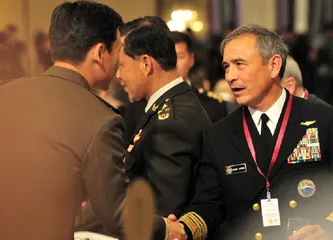Changes in China-U.S.-Europe Trilateral Relations
作者: Zhao Huaipu

As the three major forces in the international system, China, the United States and the European Union will bring about multilateral effects on international pattern and then speed up its readjustment no matter what happens in any bilateral relationship among them. The trilateral relations among China, the U.S. and the EU are dynamic, full of cooperation and competition, and feature long-term, complex and asymmetric games. With the rise of China and the expansion of its influence, the U.S. and the EU constantly readjust their policies towards China and increasingly strengthen their dialogue and policy coordination against China, thus promoting the continuous evolution of the trilateral relations among China, the U.S. and the EU.
CHINA’S RISE FACILITATES THE FORMATION OF THE TRILATERAL RELATIONS AMONG CHINA, U.S. AND EU
China’s rise has become the primary factor affecting the readjustment of the international pattern since the end of the Cold War, particularly since the beginning of the 21st century. The U.S. and the EU as the major founders and leaders of the current international order are worried about China’s rise and its possible impact on the international order and their own interests. Therefore, they share common interests in maintaining a favourable international order and regard each other as a natural partner.
The U.S. and the EU have gradually strengthened their interaction on China question along with the continuous readjustment of their respective China policies. The U.S. and the EU have both made readjustment on their China policies in the 1990s. In 1995, the EU released its first China policy document, The Long-Term Policy on EU-China Relations, which took enhancing dialogue and cooperation with China as the long-term goal of its China policy. The most fundamental factor in EU’s China policy is the economic motivation, hoping to bring China into and bind it to the international mechanism through contact. China policy of the U.S. highlights the realistic power politics logic, which aims to influence and change China in line with the U.S. own interests. Therefore, the U.S. has taken multiple approaches to suppress China, such as strengthening the East Asian alliance system as well as the bilateral relations with East Asian countries, influencing and interfering with the process of East Asian cooperation and strengthening military deterrence, etc..
The readjustment of their policies towards China by the U.S. and the EU has stimulated the rise of China-related dialogue between the two sides. In the late summer of 2001, experts from some think tanks in the United States and Europe launched the transatlantic dialogue on China or East Asia, aiming to explore China’s future trend and its role in the world and predict the problems caused by the differences between the U.S. and the EU on China’s rise. In May 2005, the two sides built a strategic dialogue mechanism involving high-level decision-makers to deal with China’s rise, marking the upgrading of the level of the dialogue from track two to track one. Later, as a result of the shelving of the EU’s arms sales ban to China, especially the shifting of the attention of the U.S. and the EU to the situation in Iraq and the Iranian nuclear issue, the official strategic dialogue was relatively relaxed.
All in all, China’s rise gave birth to the trilateral relations among China, the U.S. and the EU, and aroused the strategic interaction between the U.S. and the EU to jointly deal with China, although with very limited early achievements. Both sides hope to integrate China into the current international system, yet the U.S. is more likely to view China’s rise from a geopolitical perspective and seek to contain China. As a contrast, the EU pursues a China policy centred on the strategy of engagement and partnership. However, the opening of the China-related dialogue between the U.S. and the EU is after all an important trend in the strategic relationship between the two sides after the Cold War, which has laid a foundation for both sides to strengthen their future interactions on China.
U.S. AND EU STRENGTHENING INTERACTIONS ON CHINA AFTER INTERNATIONAL FINANCIAL CRISIS
The international financial crisis and the European debt crisis in 2008 have severely damaged the strength of the U.S. and the EU, and enhanced the readjustment of the international pattern toward the trend of declining West and prospering East. With the changing in the strength of China, the U.S. and the EU, the cognition of the U.S. and the EU on China’s rise is becoming more diverse and negative. The U.S. has been wantonly playing up the so-called “China threat”, while the EU also began to analyse the possible impact of China’s rise on Western interests from the perspectives of politics, economy, environment and development model.
In this context, both the U.S. and the EU have further readjusted their policies towards China. China policy of the U.S. becomes more targeted and offensive than ever before, while that of the EU is more bifacial. On one hand, the EU wants to get rid of the difficulties caused by the debt crisis through strengthening its cooperation with China. On the other hand, the deepening of strategic suspicions about China has resulted in more intention of containing and preventing China’s development. The rise of China’s strength after the international financial crisis has aroused more strategic vigilance in the U.S. and the EU, so both sides feel more urgent to respond together and strengthen coordination.
After years of silence, the U.S. and the EU began to increase the China-related dialogues significantly since 2009, which have shown some new features. Firstly, with more extensive contents, the track two dialogues are obviously more in-depth and specific. Both sides stress that the dialogues should fully cover the questions in the U.S. and EU relations with China, including economy, trade and finance, military contacts and military technology transfer, domestic governance, human rights, among others. They both believe that they should build a framework for comprehensive and constructive interactions in dealing with China’s rise.